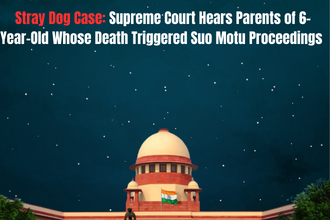In a landmark development, the Supreme Court of India has emphatically reaffirmed the foundational principle that the Constitution is supreme, not the Parliament. This comes amidst heightened tensions between the judiciary and certain high-ranking political leaders, including Vice President Jagdeep Dhankhar and BJP MP Nishikant Dubey, over the role and authority of constitutional courts.
Judicial Review: A Constitutional Mandate, Not Judicial Overreach
The Supreme Court bench comprising Chief Justice of India Sanjiv Khanna and Justice Sanjay Kumar stated unequivocally that judicial review is a constitutional function, explicitly provided for under Articles 32 and 226 of the Constitution. The Court emphasized that when it examines the constitutionality of laws, it acts within the framework of the Constitution, not outside it.
“It is the Constitution which is higher than all of us. The Constitution imposes limits and restrictions on the powers vested in the three organs—legislature, executive, and judiciary,” the Court observed.
This assertion serves as a direct rebuttal to Vice President Dhankhar’s controversial remarks claiming that “Parliament is supreme” and that there is “no authority above Parliament.” The Court clarified that while each organ of the State has its designated role, none is above the Constitution, and all must operate within its limits.
The Context: Political Attacks on Judiciary
The Court’s remarks come in response to growing political criticism, particularly after the judiciary’s involvement in petitions challenging the Waqf (Amendment) Act 2025. BJP MP Nishikant Dubey stirred further controversy by accusing CJI Sanjiv Khanna of inciting civil unrest and claiming that the Supreme Court was responsible for religious strife in the country.
In the PIL titled Vishal Tiwari v. Union of India [2025 LiveLaw (SC) 547], an advocate sought suo motu contempt proceedings against Dubey for his derogatory comments. Although the Court condemned Dubey’s statements as “highly irresponsible” and “attention-seeking,” it chose not to initiate contempt action, reasoning that public confidence in the judiciary could not be shaken by “such absurd comments.”
The Principle of Checks and Balances
Reiterating the doctrine of separation of powers, the Supreme Court underlined the need for mutual respect and constitutional boundaries among the three wings of government. It noted that judicial review is not an encroachment upon legislative supremacy, but a necessary constitutional safeguard to ensure laws do not violate fundamental rights or exceed constitutional limits.
“The power of judicial review hinges on the system of checks and balances… Citizens approach the court to uphold their fundamental and legal rights. It is not a political exercise but a judicial one based on legal principles,” the Court noted.
Political Reactions and Constitutional Misconceptions
The assertion of “Parliamentary Supremacy” by political figures like Vice President Dhankhar reflects a misunderstanding of India’s constitutional framework, which is unlike the British model where Parliament is indeed supreme.
India follows a Constitutional Supremacy model, where:
- The Constitution is the grundnorm (basic norm).
- All three wings—Legislature, Executive, and Judiciary—derive their powers from the Constitution.
- No institution, including Parliament, can act contrary to constitutional provisions.
The Court’s statement is a significant defense of the Basic Structure doctrine, which ensures that essential constitutional values, including judicial review, secularism, and federalism, remain inviolable.
Relevance of Articles 32 and 226
The judgment also brought attention to Articles 32 and 226, which empower the Supreme Court and High Courts respectively to issue writs for the enforcement of fundamental rights and other legal rights.
- Article 32: Called the “heart and soul” of the Constitution by Dr. B.R. Ambedkar, this Article allows individuals to approach the Supreme Court directly for the protection of fundamental rights.
- Article 226: Grants wide discretionary powers to High Courts to issue writs not just for fundamental rights, but also for legal rights and administrative remedies.
Through these Articles, the judiciary performs its constitutional obligation to keep all actions of the State within legal bounds.
No Room for Hate Speech and Irresponsible Commentary
The Court also issued a cautionary note regarding the growing trend of hate speech and politically motivated attacks on constitutional institutions. While the Court refrained from punishing Dubey, it made it clear that attempts to spread communal hatred and disrespect for judicial authority will not be tolerated.
“Any attempt to cause alienation or humiliation of a targeted group is a criminal offence and must be dealt with accordingly,” the Court said, reflecting a no-nonsense approach to divisive rhetoric.
Significance of the Judgment
This ruling holds significant implications for the ongoing debate over judicial independence and the limits of legislative power. It:
- Strengthens the legitimacy of judicial review.
- Reaffirms the supremacy of the Constitution over all other authorities.
- Dismisses politically motivated narratives that undermine the judiciary.
- Sends a strong message about institutional respect and constitutional literacy.
It also provides clarity at a time when public discourse is increasingly marred by misinformation about the roles and powers of various branches of government.
Conclusion
The Supreme Court’s bold reiteration that “the Constitution is higher than all” is not merely a legal pronouncement but a powerful constitutional reaffirmation. In an era where democratic institutions are frequently tested by populist narratives and political polarization, the judiciary’s role as the guardian of the Constitution becomes all the more vital.
This judgment will be remembered as a timely intervention that protects the delicate balance of powers and safeguards the democratic fabric of India. In the words of the Court, “Judicial decisions are made in accordance with legal principles and not in keeping with political, religious or community considerations.”
By standing firm, the judiciary has not only defended its own integrity but has also upheld the spirit of constitutional democracy envisioned by the framers of the Indian Constitution.


